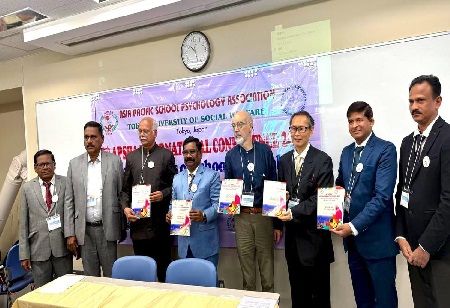- Pondicherry University VC P. Prakash Babu highlights the crucial role of school psychologists in student mental health at the 8th APSPA International Conference in Tokyo.
- He cites Japan’s integration of psychology in education as a model for fostering emotional resilience and social adaptability in students.
- Babu emphasizes India’s NEP initiatives to balance academic excellence with mental well-being and holistic student development.
P. Prakash Babu, Pondicherry University Vice-Chancellor and renowned neuroscientist, recently emphasized the pivotal role of school psychologists in the enhancement of student mental health and determining the educational future in the 8th Asia Pacific School Psychology Association (APSPA) International Conference at Tokyo University.
During the conference, which highlighted the development of school psychology in the Asia Pacific region, he stressed that social and emotional difficulties among students have a close relationship with neural functioning. He encouraged participants, who included experts and teachers from throughout the region, to utilize their skills to enhance the profession of school psychologists in overcoming these difficulties and facilitating the full growth of students.
Vice-Chancellor Babu also presented in his keynote address some lessons from his post-doctoral studies in Japan on the nation's firm dedication to psychological and educational research. He pointed out that the Japanese focus on embedding the psychological point of view within education is an important model for building effective mental health services systems within schools. In a press release by Pondicherry University, he emphasized that making use of scientific knowledge about the brain and behavior can make interventions to foster emotional resilience and social adaptability in students more effective.
Also Read: ASEAN Policy Forum 2024 Focuses on Resilience in Higher Education
Vice-Chancellor Babu also underlined the initiatives by India under the National Education Policy (NEP) to integrate mental well-being, counseling, and psychological care as integral aspects of comprehensive education. The NEP seeks to provide equal weightage to academic excellence and social and emotional growth, developing an educational system that equips students to face multifaceted challenges while sustaining mental health and wellbeing.
The conference was opened by Sibi George, India's Ambassador to Japan, and had the participation of prominent leaders in the sector, such as L. M. Lopez, Chairman of Tokyo University of Social Welfare, Jiro Sakai, President of Tokyo University of Social Welfare, and Panch Ramalingam, Conference Chairman and APSPA International President.
The conference provided a forum for researchers, educators, and mental health professionals to share information and discuss models for implementing psychology into education systems throughout the Asia Pacific. The Vice-Chancellor Babu's opening speech emphasized the imperative of school psychologists as key players in enhancing students' mental well-being, reiterating emotional resilience as the quintessential aspect of future-oriented education.

